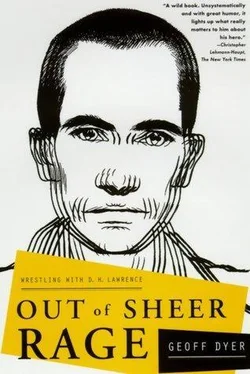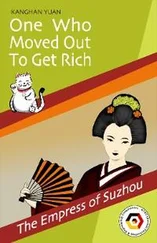I put down my beer like a judge pounding his gavel, clutched the ends of my towel with both hands and said, ‘You’ve got to respect the ocean.’
‘You said it man. What’s your name anyway?’ said the Californian, reaching out his hand.
‘Call him Ishmael,’ said Laura. ‘Ishmael or Hombre.’
We hung out with our new friends for the rest of the day and then, in the evening, back in Puerto Angel, we had the quarrel about our tuna steaks. Laura fell ill the next day. She had a fever and terrible diarrhoea and spent the whole day lying on her bed in the hotel where major renovations were taking place. We were woken at six by the incredible sound of birds; once that had died down the drilling started. I went to the beach with my mask and snorkel but the water was too murky to see anything. The sun was too hot. I could feel it piercing my skin, doing damage. It has changed since Lawrence’s time, the sun. Then it healed, now it harms. I looked down sometimes and was surprised that I cast a shadow: the sun was hot enough to go straight through me and dissolve shadows. I had been in hot places before, I like hot places, but I had never been anywhere as hot as this. Even though, technically, I had been in places that were maybe a few degrees hotter, I had never been anywhere that felt as hot as here — except Rome perhaps. Who knows? There’s something about the heat, in places that are seriously hot, that compels you to think not in relative but in absolute terms. One lives in a perpetual, boiling present. Even people who have lived in hot places all their lives, whose families have lived there for generations, feel compelled to comment on how hot it is, as though they have never felt anything like it. In a seriously hot place, somewhere where temperatures coagulate for six months a year in the nineties, people are commenting in astonished, resigned tones about the heat every ten minutes. Eventually that is all you do: you wipe your forehead and say how hot it is. Entire summers can pass like this. Apart from the heat, nothing else happens. The heat is the only news. For some peoples the sum total of their destiny is to mop their foreheads and remark on the heat. A good life, I think, one unclouded by culture. The sun beats down. Only the angles change. One moment you are young — a boy in shorts and T-shirt, or a girl barefoot, in sandals — the next you are ancient, worn out and widowed, but that moment lasts at least one lifetime, usually several.
When it became too hot — which was all the time — I went back to find Laura on her bed, shivering and sweating, her ears plugged with cotton wool to keep the drilling at bay. People often fall ill in Mexico, I thought to myself, you expect to fall ill in Mexico, you go to Mexico to get ill. Lawrence became incredibly ill in Mexico (‘malaria — with grippe — and typhoid’) and now Laura was incredibly ill. I wasn’t ill but I felt strange: disoriented, exhausted. It was too hot and I was not used to smoking such strong grass. I had nothing to read except The Plumed Serpent : an interesting case of the site-specific book which you bring to read because it is set in the place you are visiting but which you cannot bear to read. There are people who can read anything to pass the time, and our situation should have forced me to read The Plumed Serpent but I simply could not bear to. I preferred to stare into space. Laura lay on her bed. The French guy whose girlfriend had almost drowned told us there was a good doctor in Oaxaca, and we decided to take a bus there, to ‘beastly Oaxaca’ as Lawrence called it, not because we had any particular desire to seek medical assistance — the difference between being ill and being in robust health was becoming increasingly hazy — but because we felt the need to do something, to assert ourselves, to prove that we still had the capacity to act, to play a part.
Laura was too weak even to pack and so, grumbling and muttering under my breath, I got all our stuff together. I wrapped up the grass and stored it in my glasses case and then, still muttering and grumbling, lugged our bags to the bus station. It felt good to be on the move even though it felt terrible to be on the bus again. We had spent too long on buses and it is possible that although it was the tuna steaks that did for Laura it was the interminable bus journeys that softened her up, weakened her resistance to the point where a mere tuna steak was enough to finish her off. We had made terrible mistakes. The whole of our Mexico trip, it seems to me now, looking back, was a terrible mistake. We crossed the border at Tijuana which was a mistake: we should have flown to Oaxaca direct instead of crossing the border at Tijuana and then taking a bus right down Baja California where there was nothing to see for hundreds and hundreds of miles. Even if we had crossed the border at Tijuana instead of flying to Oaxaca, even if we had made that mistake, we should have caught a train in Tijuana or taken a bus down to Los Mochis not, as we did, compounding our mistake by travelling all the way down Baja California where there is nothing to see for hundreds and hundreds of miles. Never reinforce failure: that is the first rule of military strategy. But we kept reinforcing our failure, kept taking buses that nudged us towards Oaxaca, rather than cutting our losses and flying straight there. We caught a ferry at La Paz, a vile ferry that left us so exhausted that when we arrived at Mazatlán we were too tired to think and got straight on a bus to Guadalajara. We kept pressing on, taking more and more buses, getting more and more exhausted. The longer we spent on buses, the less significant each additional instalment of the journey by bus seemed. How long would the bus take from Guadalajara to Mexico City? Eight hours? Eight hours was nothing. Two tickets please. And so it went on until it seemed that all our experience of Mexico would amount to was peering out of bus windows. One says Mexico, one means a bus. Finally we could take it no more. We arrived in Mexico City, took a bus to the airport and got on the first plane to Puerto Escondido.
Originally the idea had been to go to Oaxaca, to seek out Lawrence-related places, and then spend a week chilling in one of the Puertos — Escondido or Angel — before heading up to New Mexico, to Taos, to resume our Lawrence research. Instead, after weeks on buses, we flew straight to Puerto Escondido which we then left, on a bus, to go to Oaxaca, where we should have flown in the first place.
Just outside Escondido the bus slowed at an army checkpoint. Teenage soldiers had pulled over another coach and hauled everyone out, were going through everything, looking for arms and drugs. It was impossible to think of a more foolish place to keep drugs than in a metal spectacles case which would clatter and flash if thrown out of the window. Always keep drugs in your underpants: that is one of my mottoes in life. Better safe than sorry, that is another. A soldier peered in through the window and waved us on.
The road became a knot tying and untying itself. The bus twisted around curves, looming over the edge of ravines at the bottom of which could be seen the charred wrecks of many other buses. One says Mexico, one means yet another bus in Mexico, swathing round bends.
On the outskirts of Oaxaca we slowed at another checkpoint. Stopped. A soldier boarded the bus which fell immediately silent. Walked down the aisle, letting the fear spread out in front of him like sweat patches on a shirt. ‘This is it,’ I kept saying to myself, over and over, ‘this is it.’ I felt resigned. There was nothing I could do. I was close to that moment of total liberation which — or so I had read — comes with arrest, when you abandon all claim to being an active participant in your own destiny. For this reason I looked completely calm. The boy-soldier said something mildly threatening to a woman just a few seats ahead of me. Walked on. Then, carbine still pointed to the floor, he raised his eyes, looked at me. Stood there and waited. I looked back at him. He was clean-shaven, possibly had not even begun to shave. His fatigues were damp beneath his arms.
Читать дальше












